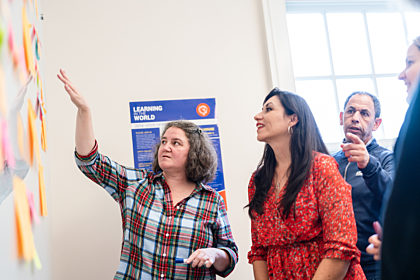Instructional Coaching
The Instructional coaching program through the Tang Institute is an opportunity for collaboration among Andover faculty. Coaches observe classes taught by colleagues and offer feedback in a supportive, non-evaluative manner. Coaches also offer an extra set of eyes in the classroom, helping faculty reflect on their teaching practice and better support student learning.
I got involved in coaching to contribute to Tang's work of fostering a culture of collaborative teaching and learning at Phillips Academy. Although collaborations among Andover's (amazing) faculty have happened for generations, Tang's program allows coaches to engage in focused and sustained partnership with individual teachers based on the learning goals each teacher has for their students.
Meet Our Instructional Coaches
Ayako Anderson, instructor in Japanese, has taught in online and brick-and-mortar classrooms for the last 8 years, quickly realizing the teaching principles remain the same regardless of the environment. She enjoys brainstorming with colleagues about activities, assessments, and community building.
Leo Calleja, instructor in English, is interested in framing pedagogical approaches (to student learning, collaboration, objectives, assessment, grading) through the lens of student experience, and welcomes opportunities to explore with colleagues how students engage with Canvas and other online platforms.
Corrie Martin, instructor in English, is curious about designing for remote project-based, collaborative learning, and creating inclusive online spaces, including how to frame commitments to, and practice, anti-racist pedagogy in a virtual classroom.
Patrick Rielly, instructor in English, views himself, for better or worse, as an internet humanist. He’s excited to collaborate on ideas for student discussion, feedback strategies, and efficient tech tools.
Juan Gabriel Sanchez, instructor in history and social science, is more social scientist than historian. With a goal of cultivating critical thinking, empowerment, and active social engagement for all of his students, he attempts to disrupt notions of objectivity in the study of history, instead encouraging students to interrogate their positionality and how it influences their experience of and place in the world.
Bridget Tsemo, instructor in English, is invested in creating classroom environments wherein each student feels seen and heard. She would love to engage in discussions about anti-racist and social justice pedagogies, virtual classroom management, and E-portfolios.

